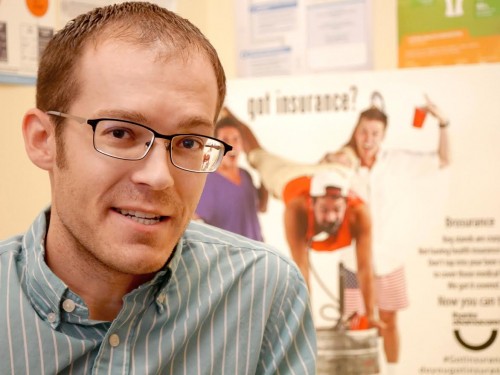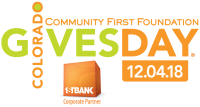Adam Fox, Director of Strategic Engagement
As an advocacy organization that actively engages in storytelling to affect change, we wanted to share our own stories too. This week I chatted with our Director of Strategic Engagement, Adam Fox, to get to know how he uses communications as a tool for advocacy. You can get to know him too by reading along with our interview below! Then you can head over to our Colorado Gives Day profile to schedule your donation today.

Isabelle: What is your role at CCHI?
Adam: Most of my job is trying to figure out how to translate what is happening in healthcare and health policy in a way that makes sense to your general consumer and trying to make sure that the people in Colorado understand how the decisions and the conversations that are happening could affect them and their health care. A lot of that is really just trying to distill the information and figure out a way to communicate it as easily and succinctly as possible, but it’s also trying to make sure we’re connecting with reporters on health care and putting information out there on our social media, email, and our website, and really just trying to make sure that consumers have as much information as possible to make decisions not only about their health care, but also how they can engage in policy decisions.
I: So how do you see yourself personally within that work?
A: For me, I think a lot of people don’t necessarily perceive communications work, which is a lot of what I do, as advocacy. But I think advocacy is as much a mindset to me as anything. And a lot of my work is making sure that individuals have the tools and resources that they need to advocate for themselves, and trying to help them share their stories and lift their voices on the health care issues that are important to them. So it’s sort of being an advocate for other advocates, and trying to make sure that they have what they need to really take action and be a part of the decisions and discussions.
I: Is there a specific story process or relationship that stays with you through this work?
A: There are so many stories that it’s hard to pick any one. There have been so many people who have shared their stories about how not having to worry about pre-existing conditions has benefitted their life and knowing that they can get the health care that they need. Some of the stories that I find particularly compelling that a lot of people don’t know as much about are the stories from Medicaid, and how it really impacts people’s lives. I think people underestimate how much of an impact health care can have on your life, especially when your health goes downhill very quickly or you develop a condition that you don’t know how to manage, and for so many people, Medicaid is a godsend for them, and it’s a huge resource.
I: Can you describe your journey to healthcare advocacy?
A: I fell into health care by chance. Really when I did my graduate studies in international policy I had every intention to be a peace negotiator or facilitating policy discussions and some of those kinds of things on an international level. When I moved out to Colorado I fell into doing health programs and enrollment in Medicaid and CHP+ for the Boys and Girls Clubs. And that really instilled in me how much good I could do right here. Really my own focus in going to grad school was just trying to make the world a better place, and I realized that there were a lot of ways that I could do that here. While I had sort of made a conscious decision not to go into health care, that’s ironically where I ended up.
I: Is there anything in the coming future that you’re looking forward to?
A: One of the biggest things that I am focused on now and that I see as a big opportunity for advocacy and CCHI as an organization is figuring out how we as a community can help individual Coloradans lift their voices on health care costs. If we don’t do something to rein in health care costs it’s going to be a huge, huge problem, economically, it will continue to pose huge barriers to health equity and racial justice and if we don’t get a handle on health care costs, we will be in very dire circumstances before too long. It’s a huge opportunity, because it’s something that affects everybody at some point. Even if you’re not using health care right now, most people have a pretty good idea of how costly and how dangerous or risky it can be in some ways to go without coverage or roll the dice that way. Or even if you have health coverage, you can still get hit by surprise bills and all sorts of other scenarios. Ultimately we need to address the health care costs if we’re going to impact all of those issues as a whole.
I: Do you identify as an advocate? How does it impact your non-work life?
A: Yes, i definitely see myself as an advocate. It’s hard to do nonprofit work, especially for an advocacy nonprofit like CCHI without being an advocate. But for me, it makes me want to care and engage on so many issues, not just health care, and trying to make sure that I am using the privilege that I have as a white, upper-middle class male to really make an impact for those that don’t have the same privilege I’ve been granted.
….
Stay tuned for more advocate profiles, and give to CCHI today by scheduling a donation through Colorado Gives Day here!

